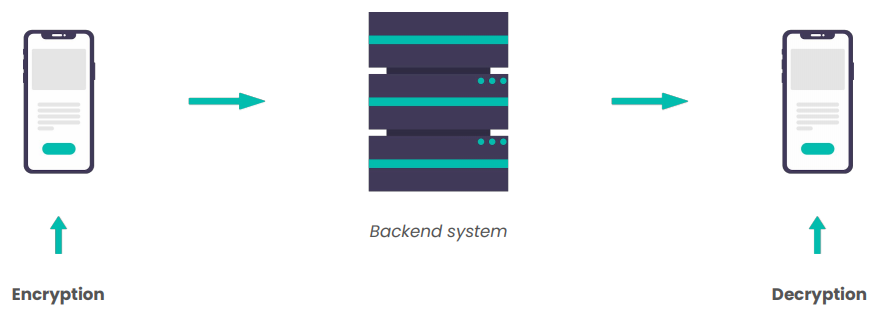CRYTA - Keep your data secret and secure

5 min read
In today’s world, end-to-end encryption is the most secure way to transfer confidential data, and that’s why more and more communication services are switching to it.
Over the past several years, messaging changed the way we get our news, interact with our colleagues, and keep in touch with the people we care about.
People around the world spend more time messaging than any other activity online, and everyone has their favorite chat app.
There are currently more than 2 billion WhatsApp users and rising, currently available in over 180 countries around the world. This puts the green messaging app far ahead of all other messaging apps such as Facebook Messenger, WeChat, Viber, Apple Business Chat, or Telegram in terms of user numbers.
The end-to-end encrypted messaging apps are more popular than ever, some of them even endorsed recently by Elon Musk and Edward Snowden.

Of course, Musk's endorsement of Signal app doesn't come out of nowhere. It follows on the news that WhatsApp, a Facebook-owned messaging app, is updating its privacy policy on February 8. 2021. That new policy will force new users to share their data with Facebook.
Encrypted messaging ensures privacy and security by making sure that only the person you are sending your messages to can actually read them. Powerful encryption software built into the messaging apps means that any third-party intercepting those messages will not be able to read them.
Modern encryption methods work in such a way that if someone changes the encrypted data, the message becomes garbled on decryption, making the problem instantly clear. There is no way to make predictable changes to an encrypted message — that is, it’s impossible to replace the text.
That ensures the integrity of your communication. If you receive a successfully decrypted message, you can be sure it’s the same message that was sent to you and that it wasn’t somehow tampered with in transit.
Do you exchange important job-related messages on a daily basis?
Standard messaging applications are not safe and well encrypted. Malicious third-party software can access your phone. What if you lose your device?
In all cases there is a significant possibility that your private data is open to whomever retrieves the device or accesses its software. Service providers could be hacked by an adversary or compromised by an insider causing sensitive information to be leaked. A fault in the service provider could cause data to be corrupted.
Amplitudo has the solution.
CRYTA is a mobile application for encrypted messaging intended for business users that uses the Internet to make calls and send one-to-one messages, which can include files and images. Messages exchanged via CRYTA cannot be read by anyone, they are not stored anywhere, and our server does not record them.
How does it work?
The CRYTA ecosystem consists of applications on mobile devices (Android and iOS) and a backend system.
Mobile devices communicate with the backend system exclusively via the WebSocket. CRYTA app uses the most secure, open source, algorithm taken from the Signal app, which is considered to be one of the most reliable encryption systems in the world.

Unlike similar message encryption apps, the CRYTA app is not available on Google play and App stores, nor does it use Google and Apple servers to exchange encrypted content and send push notifications, (the only notifications that are actually sent do not contain content, but are only used to activate the phone).
Also, Cryta offers complete server anonymity, which minimizes the risk of hacking. Code scrambling eliminates the possibility of reverse engineering.
We guarantee that we will not have access when we set up the system.
After setting up the system, the client changes the IP address of the server, sets the applications to "target" some domain unknown to us and thus we no longer have access to the server.
Without a domain, subdomain, or real server IP address, there is no way to know where the server is located, nor the ability to access it by anyone.
Lost phone = erased data
In case the user loses the device or is stolen, the system administrator has the option to mark such an account as "Lost". This label will initiate the procedure for deleting key application settings on the device itself.
In other words, when an unauthorized user launches the application for the first time, the application will delete its own settings such as server IP address or domain.
When an account is marked as "Lost", the web application automatically deletes all messages that are waiting to be delivered to that account. There are many precautionary measures taken to scramble source code if an unauthorized person manages to retrieve an application from a lost device, not being able to interpret how the application works from the source code.
Messages are automatically deleted ten minutes after opening them. If the user has not read the message even though it was delivered, it will be deleted after one hour.
The user also has the ability to set the desired time frame for deleting messages on the application itself. Messages are certainly stored in encrypted form in the device itself, and they are deleted even if the user does not read them, in a time period that he specifies (for example 1 hour).
Looking for an end-to-end encrypted chat app for business?
We’re living in a digital world where security and privacy matter more than ever.
If you are concerned about your data and value privacy, then click here to learn more about our encrypted messaging mobile application.
Arguing that you don’t care about the right to privacy because you have nothing to hide is no different than saying you don’t care about free speech because you have nothing to say. – Edward Snowden


